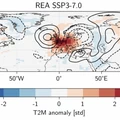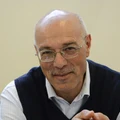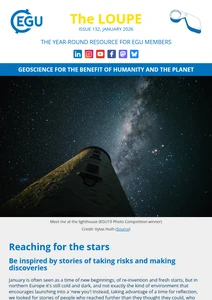President: Davide Faranda
(Emailnp@egu.eu)
Deputy President: François Schmitt
(Email)
ECS Representative: Mireia Ginesta-Fernandez
(Emailecs-np@egu.eu)
The Nonlinear Processes in Geosciences (NP) Division is an interdisciplinary division which is concerned with all aspects on nonlinear and stochastic theories, methods and data in the geosciences. The NP division is focused on a series of nonlinear paradigms whose applications cut across the different disciplines of the geosciences (hydrosphere, atmosphere, biosphere, lithosphere, space sphere…). Examples include chaos, tipping points, nonlinear waves, similarity across scales (scaling, scale invariance, fractals, multifractals), network theory, nonlinear stochastics, predictability and its limits, pattern formation, self-organised criticality, extreme events, deep learning… The NP division welcomes mathematical and theoretical approaches, as well as applications including new methodologies, new modelling and new data analysis techniques.
Due to its interdisciplinary character, many of the NP-sessions during the EGU general assemblies are co-organized with sessions from other divisions. Potential contributors to any session are encouraged to evaluate the benefits of a multi-disciplinary organization in collaboration with the corresponding disciplinary Division.
The division is structured into several subdivisions (see the “About” tab above, for the NP Division structure information and reports).
The Division contributes to the EGU Awards & Medals programme. As for all EGU Divisions, an Early Career Scientist Award is established also for the NP Division and is given to young researchers who obtained outstanding results in the nonlinear geosciences. Every year the Lewis Fry Richardson medal is awarded to scientists for their exceptional contributions to nonlinear geosciences in general. Members of the Division are invited to contribute to the nominations (deadline are every year on the 15th June, see here) for both the NP Division Awards and Medals.
The division maintains very strong links with the EGU publication committee, and especially with the board of Editors of the open access journal Nonlinear Processes in Geophysics (NPG), an interdisciplinary journal for the publication of original research furthering knowledge on nonlinear processes in all branches of Earth, planetary, and solar system sciences.
Latest posts from the NP blog

New Editorial Voices at NPG
As part of welcoming new members to the editorial team of Nonlinear Processes in Geophysics (NPG), we are pleased to present short interviews with two newly appointed editors, Dr. Kira Rehfeld and Dr. Jezabel Curbelo. They share their scientific backgrounds, motivations for joining the journal, editorial goals, and perspectives on emerging research directions in nonlinear geosciences. Their insights reflect both the interdisciplinary spirit of NPG and its commitment to advancing high-quality, constructive scientific exchange. Dr. Kira Rehfeld is a Professor …
Read more

Turbulence (and not only): The Legacy of Vincenzo Carbone, 2025 Richardson Medal
One year ago, Vincenzo Carbone left us. Vincenzo was a leading scientist in nonlinear geophysics, turbulence, and complex systems, influencing fluid and plasma physics, weather and space weather, solar–terrestrial relations, and climate dynamics. Yet for those who worked closely with him, his legacy goes well beyond his remarkable scientific achievements. Scientific Contributions and Impact Over more than three decades, Vincenzo provided fundamental new concepts and contributions for the characterization of magnetohydrodynamic (MHD) turbulence and intermittency, laying the foundation for the …
Read more

ECS Spotlight: Evolution of the Dynamics of Centennial Hot Summers in Western Europe With Climate Change
Extreme meteorological and climatological events can be immensely damaging and disruptive to society. Understanding the physical mechanisms driving these events, and how they will evolve with climate change is crucial for informing societal adaptation to our changing climate. However, extreme events are, by definition, rare. Our capacity to understand these events is, therefore, hindered by the small sample size of observed events. Recent methodological developments, termed rare events algorithms, have enabled the sample size of these types of events to …
Read more

Rethinking the carbon cost of scientific exchange: Nonlinear effects of reducing scientific mobility
The carbon footprint of scientific collaboration has become an increasingly debated topic. Conferences, workshops, and research travel remain central to how science function, yet they also contribute to global greenhouse gas emissions. Since the pandemic era scientists also learned to work virtually and to attend workshops and conferences online. Understanding the carbon footprint, and how it compares to other global activities, is essential for defining realistic and fair strategies for sustainable science. This is valid not only for scientific conferences …
Read more
Recent awardees

- 2025
- Lewis Fry Richardson Medal
The 2025 Lewis Fry Richardson Medal is awarded to
Vincenzo Carbone for outstanding contributions to the study of turbulence in magnetohydrodynamics, particularly in the solar wind and space plasmas, as well as its impact on the Earth’s magnetosphere and climate.
Read more

- 2025
- Division Outstanding Early Career Scientist Award
The 2025 Division Outstanding Early Career Scientist Award is awarded to
Johannes Jakob Lohmann for important contributions to our understanding of non-linear climate dynamics during the last glacial period.
Read more

- 2025
- Outstanding Student and PhD candidate Presentation (OSPP) Award
The 2025 Outstanding Student and PhD candidate Presentation (OSPP) Award is awarded to
Joaquín Espinoza Troni Electron scale magnetic holes generation driven by Whistler-to-Bernstein mode conversion in fully kinetic plasma turbulence
Read more
Current issue of the EGU newsletter
In our January issue, we are choosing to reflect on the ambition and risks of science - not a new year, new you, but rather a steady determination to discover, based on our existing, deep wells of curiosity. Catarina Aydar talks about how exploration sometimes goes hand-in-hand with tragedy with the story of the first attempt of a teacher, Christa McAuliffe, to go to space, onboard the ill-fated Challenger, whilst Sabrina Minnick, shares the triumph of Jacobus Kapteyn revealing the proper motion of the stars over 100 years ago. Astrobiological chemist Silke Asche talks about her work searching for life on other planets, and András Zlinszky shares his tips for your best EGU General Assembly yet! Also don't miss our on all the upcoming webinars, newest publications, a brand new EGU open access journal, and a job vacancy in the EGU Executive office in Munich, Germany!
All this and much more, in this month's Loupe!
Read more








